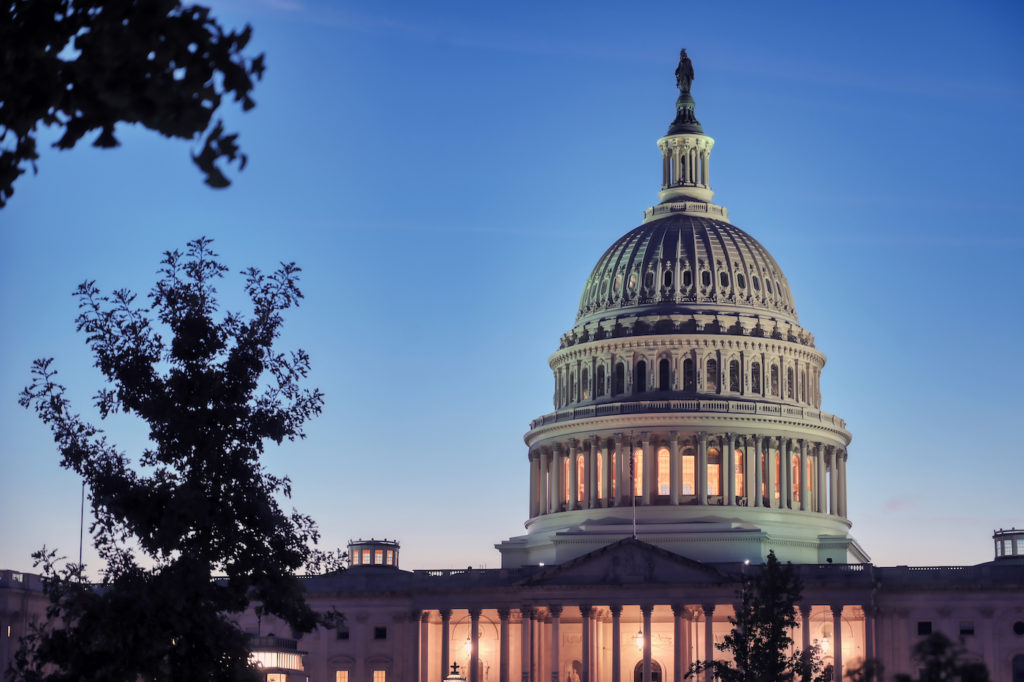In mid-January, the Senate convened to consider election reform legislation. Many years had passed since the “world’s greatest deliberative body” had formally taken up the issue.
The chamber spent a little over a dozen hours on the matter, almost all of which were consumed by senators delivering monologues to a mostly empty chamber. Democrats name-checked Martin Luther King, Jr. innumerable times, bombastically claimed “avalanches” and “tsunamis” of voter disenfranchisement, and called for reforming the filibuster to save democracy. Republican senators mostly dumped cold water on their colleagues’ hyperbole.
There was surprisingly little discussion of the particulars of the legislation—an astonishing thing, as the bill was 700 pages and surely imperfect. Rather than debate the bill before the public, senators chose to give speeches, dodge deliberation and negotiation, and attempt to change the rules to further curb debate. The jaundiced voter taking it all in might well conclude, “Maybe our representative democracy is dying.”
These days, major debates on the floor of the Senate and House of Representatives are exceedingly rare. Leaders in both chambers do all they can to prohibit arguing between legislators when bills are brought to a vote. The House precludes debate by adopting closed rules before voting on a bill. Such rules limit debate on a bill to mere minutes and forbid legislators to offer amendments. The Senate achieves much the same by operating under unanimous consent agreements, in which the majority leader gets each senator to agree to not speak on the legislation to be voted on, and to forgo the ability to offer amendments.
Start your day with Public Discourse
Sign up and get our daily essays sent straight to your inbox.Denied opportunities for substantive debate, legislators redirect their voices. As Yuval Levin has observed in A Time to Build, congressmen use their powers of speech not to persuade each other that their ideas have merit, but to please “an outside audience that wants to see a dramatic enactment of culture-war animosity.” Any properly functioning legislature needs a “sanctum” where deliberation can occur. But as Congress’s activity is increasingly televised and tweeted, “there is less and less room for talking in private,” resulting in a breakdown of the common work of legislating. Political scientist Joseph Bessette, too, has worried that the excessively public nature of deliberation in Congress gives lawmakers incentives to posture instead of deliberate. In committee and on the floor, many lawmakers are found “playing to the cameras or trying to make headlines,” which “can make genuine reasoned exchange virtually impossible.”
It is clear enough that there is dysfunction in Congress. But to understand what has gone wrong, we need to know what the institution of Congress is for and how speech is supposed to function there.
The Ancients on Political Speech
Speech’s preeminent role in Congress has its roots in ancient political heritage. The Founders drew on a tradition of thought going back to Aristotle that emphasizes the centrality of speech in politics. For Aristotle and his heirs, the realm of politics exists because of our capacity for speech, which sets us apart as political animals. Hannah Arendt explained in The Human Condition that speech is a communal exercise that allows us to share meaning with others. In Aristotle’s estimation, said Arendt, barbarians and slaves who did not participate in the polis were deprived “of a way of life in which speech and only speech made sense and where the central concern of all citizens was to talk with each other” (emphasis added).
Jeremy Waldron, also commenting on Aristotle, formulated the “doctrine of the wisdom of the multitude”: Human beings are better off when they synthesize their diverse perspectives into “collective knowledge, experience, judgment, and insight.” Politics happens when citizens talk to each other, not as beasts uttering incompatible “expressions of individual utility” but as rational creatures using the faculty of reasoned speech (logos) to obtain goods no one could obtain on his own (that is, common goods).
Political speech has to do with our innate faculties as human beings. Meaningful speech is possible because we are more than selfish beasts driven by whim or instinct. And it is necessary because we cannot simply scale the heights of pure rationality to discern the good. We will inevitably disagree about justice, the good life, and the best way to achieve both—but we can still talk to each other, hashing out moral and practical questions in the dynamic conversation that constitutes politics. Difference of opinion is a feature of political life, not a bug.
It is popular to critique our politicians for spending too much time talking and not enough time getting things done. Certainly, the particular forms of speech some of our political leaders are habituated to—spewing empty insults, promises, and partisan talking points on cable news to gain celebrity and political clout—shirk the real task of political leadership.
But we should not exaggerate the distinction between talking and doing, or unduly elevate the latter. As Arendt explains, action and speech are inseparable in politics. Action divorced from speech is despotic: the ruler unilaterally executes his will without attempting to be understood by others. At the same time, speech can be reduced to “‘mere talk,’ . . . whether it serves to deceive the enemy or to dazzle everyone with propaganda.” This should bring to mind the spectacles of our own Congress. Yet the solution is not less talking, but more of the right kind of talking—conversation that reflects the “human togetherness” of politics.
We will inevitably disagree about justice, the good life, and the best way to achieve both—but we can still talk to each other, hashing out moral and practical questions in the dynamic conversation that constitutes politics. Difference of opinion is a feature of political life, not a bug.
Deliberation and Our Constitutional Republic
Like ancient political thinkers, the Founders saw that reasoned political discussion was vital to the republic’s well-being. The authors of the Constitution believed that republican government should foster “the deliberate sense of the community” (Federalist 71) through institutions that refine and elevate public opinion. Central to this form of government is the conviction, as Bessette observed, that
there are two kinds of public voice in a democracy—one more immediate or spontaneous, uninformed, and unreflective; the other more deliberative, taking longer to develop and resting on a fuller consideration of information and arguments—and that only the latter is fit to rule.
Popular government that enacts the whims of the “unreflective” public voice quickly devolves into mob rule—a prospect that terrified the Founders. So they crafted institutions that would allow the “deliberative” public voice to develop over time.
Congress, where the people’s representatives gather to work through their differences, most directly embodies the deliberative public voice. Speech obviously plays a vital role in Congress’s proceedings: it is the means by which elected officials with diverse views and interests forge compromises based on mutual understanding.
In assemblies like Congress, there is always the danger that speech will be used demagogically, to undermine deliberation rather than encourage it. In Federalist 58, James Madison warned that “the eloquence and address of the few” may determine the decisions of a whole assembly. In the democratic assemblies of ancient republics, “a single orator, or an artful statesman, was generally seen to rule with as complete a sway, as if a sceptre had been placed in his single hands.” Elsewhere, Madison worried that men’s passions could cancel out the benefits of a deliberative forum: “The advantage enjoyed by public bodies in the light struck out by the collision of arguments, is but too often overbalanced by the heat proceeding from the same source.”
But the Founders thought the U.S. Congress was a place where deliberation would prevail, not demagoguery. The national legislature would be big enough to “secure the benefits of free consultation and discussion” (Federalist 55), but small enough that every representative could be an active participant in the conversation. Madison and other Founders hoped bicameralism, staggered elections for the chamber, and differing bases of representations (states and districts) would restrain the excesses of popular government and give reason and the public good a fighting chance. Representatives would be forced to debate and agree before the might of government could be deployed.
Speech obviously plays a vital role in Congress’s proceedings: it is the means by which elected officials with diverse views and interests forge compromises based upon mutual understanding.
Reclaiming Debate and Self-Governance
America’s Founders knew how susceptible we are to less than reasonable passions and desires. But they saw too our capacity for reason and mutual concern. When they established Congress at the heart of our republican government, they put their trust in the estimable qualities of human nature. A properly functioning Congress is supposed to facilitate deliberation through debate. That presumes lawmakers will use their innate capacity for reasonable speech in ways that are conducive to the public good.
Thus, the Framers’ vision obligates members of Congress in certain ways. According to Waldron, legislators must use their vote “in a way that interacts deliberatively with others,” must “bring their experience and their opinion about the good to the assembly in a form that can be communicated to others, and must listen to others and reflect on what they say.” This in turn demands certain virtues or dispositions: one must be able to explain oneself clearly, listen to others, and bring the best parts of diverse views into a creative synthesis. “These are skills of empathy, but they are also, of course . . . skills of rhetoric,” Waldron explains.
Individual members can reorient their thinking toward these virtues and skills on their own initiative. But for them to behave as proper legislators, the institution as a whole should be reformed. Levin has argued that a Congress oriented “toward enabling accommodation and compromise would have to allow for more private deliberation” and would have to “treat conflict and debate as signs of health rather than failure.”
Achieving that objective means legislators must strike a new bargain with leadership in both chambers that gives them the space to debate and legislate. Most fundamentally, committees must regain the authority to strike deals on contentious public matters (like immigration), and then to have their legislative bargains voted on. And individual legislators must have the opportunity to submit amendments and have their worthiness debated.
We can revive democratic self-governance by reclaiming responsibility for it. We should expect more of Congress, and members of Congress should expect more of each other.
Cynics may question whether legislators actually want to govern. Indubitably, some legislators conceive of their positions as little more than opportunities for self-promotion before television viewers and social media scrollers. Show horses in Congress have always been with us—but so have work horses.
For all the disappointments of the Senate’s January no-debate over election reform, there was a silver lining: around half the chamber’s senators spoke. Many of them expressed their delight in getting the chance to debate. “It actually feels good to hear people really speak on an issue,” remarked Senator Patrick Leahy (D-VT). Some senators even went so far as to respond to contentions made by other senators, and offered their own ideas of what bipartisan election reform might look like.
Warnings about the impending death of American democracy are premature. We can revive democratic self-governance by reclaiming responsibility for it. We should expect more of Congress, and members of Congress should expect more of each other. Americans and their elected leaders are fully capable of having a fruitful, good-faith conversation about the public weal. But to do so requires them to choose to reestablish debate within Congress, and to concurrently cultivate trust, responsibility, and a spirit of accommodation.













